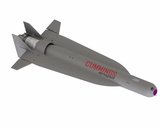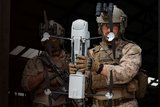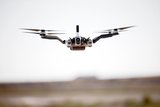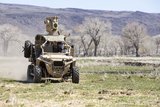Rockwell Collins navigation system selected for AeroVironment's Global Observer Unmanned Aircraft System
The Rockwell Collins Athena 411 Inertial Navigation, Global Positioning, Air Data, Attitude, Heading, Reference System (INS/GPS/ADAHRS) has been selected by AeroVironment for their Global Observer.
AeroVironment is developing Global Observer, a liquid hydrogen-powered Unmanned Aircraft System (UAS) that will fly at an altitude of 65,000 feet for up to seven days, for the U.S. Special Operations Command as well as for other military and civilian applications.
“We believe our proven high-performance, high-reliability solution, embodied in the compact, light-weight Athena 411, will enable the Global Observer to achieve its unique mission and performance goals,” said David Vos, senior director of Control Technologies for Rockwell Collins. “We look forward to working with AeroVironment to provide best-value navigation solutions for this advanced program.”
Developed for both UAS and military applications, the Rockwell Collins Athena 411 integrates solid-state gyros and accelerometers, magnetometer, GPS receiver and air data sensors into a single small unit. This highly reliable, strap-down system provides attitude and heading measurements with accuracy that is superior to traditional inertial navigation systems.
Rockwell Collins is also providing the Global Observer with our ARC-210 radio solution, which offers two-way, multi-mode voice and data communications over a 30 to 512 MHz frequency range. The system also includes embedded Ultra High Frequency (UHF) and Very High Frequency (VHF) anti-jam waveforms and other data link and secure communications features.
AeroVironment is developing and building the Global Observer aircraft over the next three years to demonstrate the ability to operate in the stratosphere for up to seven days without landing. The program is intended to demonstrate the tactical utility of a hydrogen-powered unmanned aircraft system for global, stratospheric, long-duration missions.
A system consisting of two or three aircraft will provide continuous intelligence, surveillance and reconnaissance or communications relay over an area of interest. In addition to military applications, the Global Observer is being developed to address critical civilian applications such as hurricane/storm tracking, weather monitoring, wildfire detection, and sustained support for relief operations
More from Uncrewed Vehicles
-
![Cummings Aerospace showcases Hellhound loitering munition designed for US Army’s LASSO programme (video)]()
Cummings Aerospace showcases Hellhound loitering munition designed for US Army’s LASSO programme (video)
Cummings Aerospace presented its turbojet-powered Hellhound loitering munition at SOF Week 2025, offering a man-portable solution aligned with the US Army’s LASSO requirements.
-
![SOF Week 2025: PDW unveils attritable FPV drone for SOF operations at scale]()
SOF Week 2025: PDW unveils attritable FPV drone for SOF operations at scale
PDW has revealed its Attritable Multirotor First Person View drone at SOF Week 2025, offering special operations forces a low-cost, rapidly deployable platform for strike and ISR missions, inspired by battlefield lessons from Ukraine.
-
![SOF Week 2025: Teledyne FLIR white paper provides guidance on reusable loitering munitions]()
SOF Week 2025: Teledyne FLIR white paper provides guidance on reusable loitering munitions
Teledyne FLIR is highlighting the emerging requirements for 'recoverable and re-usable' loitering munitions across the contemporary operating environment during this week’s SOF Week conference in Tampa, Florida.
-
![SOF Week 2025: Kraken Technology group debuts K3 Scout USV in North America]()
SOF Week 2025: Kraken Technology group debuts K3 Scout USV in North America
High-performance maritime industry player Kraken Technology Group, based in the UK, has used the SOF Week conference in Tampa, Florida this week to debut its K3 Scout uncrewed surface vessel (USV) to the North American market.
-
![Palladyne AI and Red Cat to demonstrate capabilities for autonomous drone swarms to the US military]()
Palladyne AI and Red Cat to demonstrate capabilities for autonomous drone swarms to the US military
Red Cat and Palladyne AI recently conducted a cross-platform collaborative flight involving three diverse heterogeneous drones.
-
Jammer resistant drone designs spark search for countermeasures
The Russia-Ukraine conflict has driven another stage of evolution for drones and the counter measures to defend against them.

























